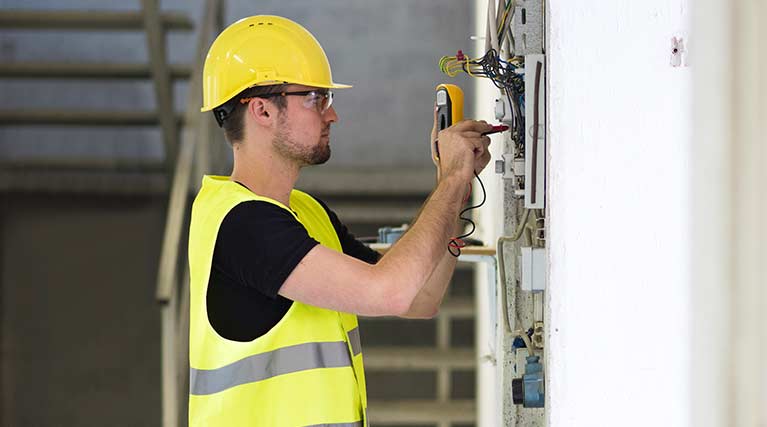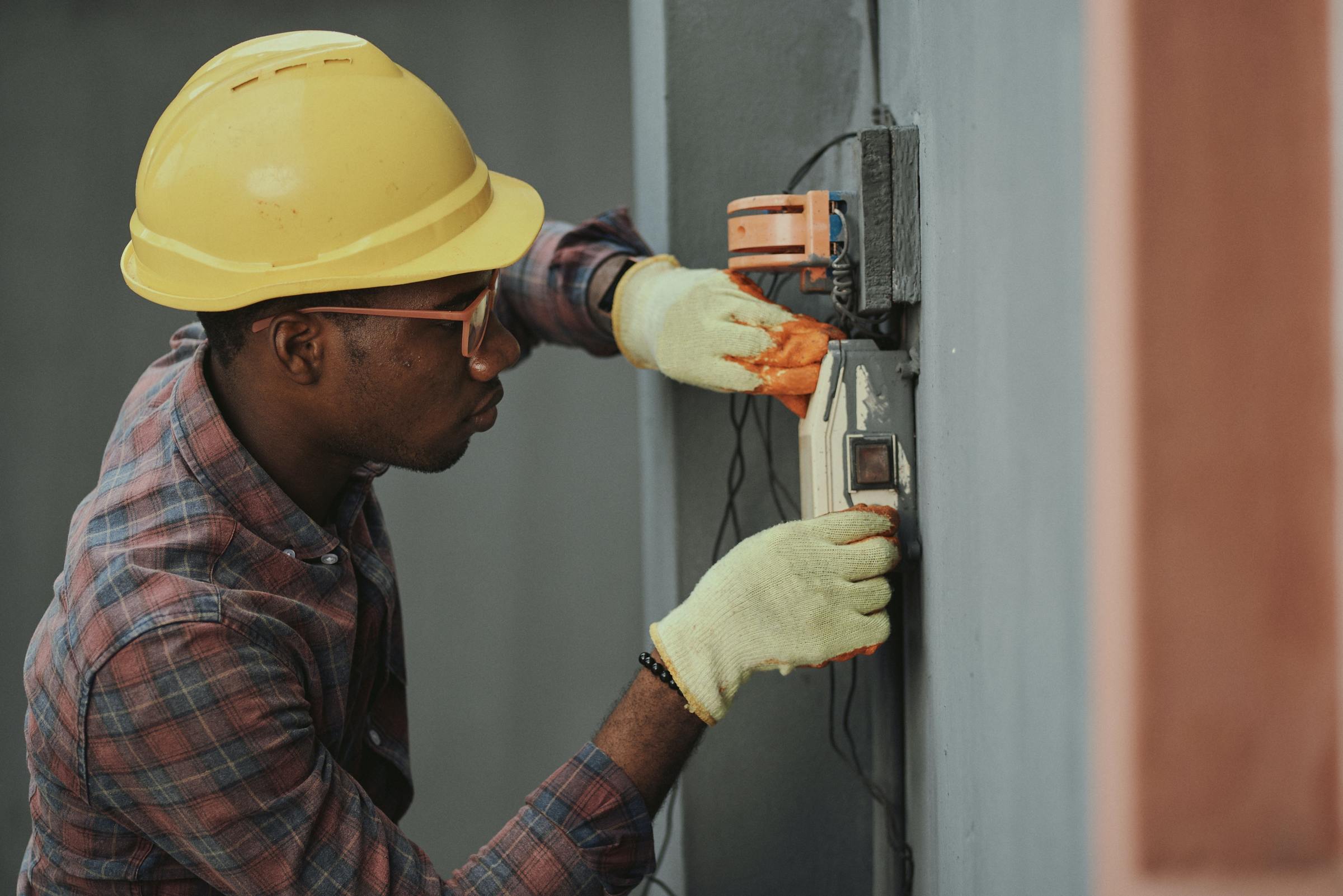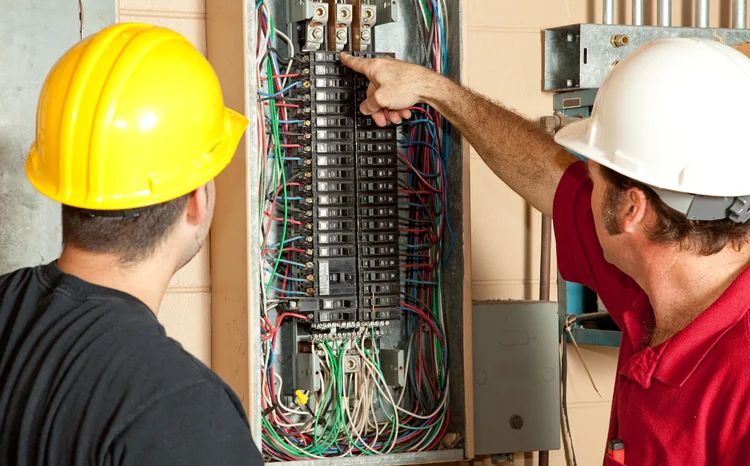An apprentice electrician assists licensed electricians in installing, maintaining, and repairing electrical systems. They learn on-the-job skills and safety practices.
Starting a career as an apprentice electrician offers hands-on experience and valuable industry knowledge. You work closely with experienced electricians, gaining practical skills in wiring, troubleshooting, and adhering to safety codes. The role requires physical stamina and a keen eye for detail.
Apprenticeships typically combine on-the-job training with classroom instruction, covering electrical theory, blueprint reading, and relevant regulations. This combination ensures a well-rounded education, preparing you for a successful career in the electrical trade. With dedication and hard work, apprentices can advance to become licensed electricians, enjoying job stability and opportunities for growth in a high-demand field.

Credit: www.sheridan.edu
Introduction To The Electrician Trade
Electricians are vital in our daily lives. They help power our homes and workplaces. Becoming an apprentice electrician is the first step in this exciting career. This journey involves learning skills and gaining hands-on experience. Let’s explore the role and importance of electricians.
Role Of An Electrician
Electricians install and repair electrical systems. They work with wiring, circuits, and fixtures. They ensure everything works safely and efficiently. An apprentice electrician learns these tasks under a skilled mentor. This hands-on training is crucial for mastering the trade.
- Reading blueprints and technical diagrams
- Installing and maintaining wiring
- Inspecting electrical components
- Identifying electrical problems
Electricians also follow strict safety guidelines. This keeps them and others safe from electrical hazards. They need to stay updated with local building codes. This ensures all installations meet safety standards.
Importance In Modern Society
Electricians keep the lights on. They power our homes and businesses. They are essential for modern living. Imagine a day without electricity. Life would come to a halt. Electricians make sure that doesn’t happen.
They also play a role in advancing technology. With the rise of smart homes, their skills are more in demand. They install and maintain complex systems. This includes security systems, home automation, and renewable energy sources.
| Electrician Task | Importance |
|---|---|
| Installing Wiring | Essential for new buildings |
| Maintaining Systems | Keeps existing systems running |
| Advancing Technology | Supports smart homes and renewable energy |
An apprentice electrician learns how to handle these responsibilities. They become skilled professionals who keep our world powered and safe.
Starting As An Apprentice
Starting as an apprentice electrician is an exciting journey. You will learn essential skills and gain hands-on experience. Your path begins with the right qualifications and finding the perfect apprenticeship program.
Qualifications Needed
To become an apprentice electrician, you need specific qualifications. These are the basic requirements:
- High School Diploma or GED: This is the minimum educational requirement.
- Math Skills: You must understand basic math, algebra, and geometry.
- Physical Fitness: You must be physically fit and able to lift heavy objects.
- Driver’s License: A valid driver’s license is often required.
Finding Apprenticeship Programs
Finding the right apprenticeship program is crucial. Here are some steps to help you:
- Research: Search for local electrical apprenticeship programs online.
- Apply: Submit applications to multiple programs to increase your chances.
- Interview: Prepare for interviews by practicing common questions.
- Network: Attend job fairs and industry events to meet potential employers.
Many organizations offer apprenticeship programs. Here are a few examples:
| Organization | Program Details |
|---|---|
| International Brotherhood of Electrical Workers (IBEW) | Offers comprehensive apprenticeship programs with hands-on training. |
| Independent Electrical Contractors (IEC) | Provides apprenticeship programs focusing on electrical skills and safety. |
| National Electrical Contractors Association (NECA) | Collaborates with IBEW to offer quality apprenticeship opportunities. |
Starting as an apprentice electrician sets you on a promising career path. Follow these steps to begin your journey today.
Essential Skills
Being an Apprentice Electrician demands a unique set of skills. These skills ensure safety and efficiency in the job. Let’s explore the essential skills an apprentice electrician needs.
Technical Skills
Technical skills are crucial for an apprentice electrician. These skills include:
- Understanding electrical circuits
- Knowledge of wiring systems
- Ability to read blueprints
- Proper use of hand and power tools
- Performing routine inspections
Safety is a top priority in this field. Apprentices must know the safety codes and regulations. They should also understand the importance of using personal protective equipment (PPE).
Soft Skills
Soft skills are just as important as technical skills. These skills help in working well with others and managing tasks efficiently:
- Communication skills: Clear and concise communication with team members and clients.
- Problem-solving skills: Quickly identifying issues and finding solutions.
- Time management: Prioritizing tasks to meet deadlines.
- Teamwork: Working well in a team to complete projects.
- Attention to detail: Ensuring all work is done accurately and safely.
Adaptability is also key in this role. An apprentice must adjust to new situations and challenges quickly.
| Skill Type | Examples |
|---|---|
| Technical Skills | Electrical circuits, wiring systems, blueprints, tools, inspections |
| Soft Skills | Communication, problem-solving, time management, teamwork, attention to detail |

Credit: partners.pennfoster.edu
Typical Duties
An apprentice electrician learns the trade while working on the job. They support experienced electricians in various tasks. Learning and following safety protocols is essential. Here are some typical duties of an apprentice electrician:
Daily Responsibilities
- Assisting with installations: Help in installing electrical systems, including wiring and lighting fixtures.
- Maintaining tools: Ensure tools and equipment are in good condition.
- Reading blueprints: Understand and interpret technical drawings and electrical plans.
- Testing systems: Conduct tests to ensure electrical systems function correctly.
- Repairing issues: Help troubleshoot and fix electrical problems under supervision.
Safety Protocols
Safety is crucial in electrical work. Apprentices must follow strict guidelines to avoid accidents. Key safety protocols include:
- Wearing protective gear: Always wear helmets, gloves, and safety glasses.
- Following lockout/tagout procedures: Ensure machines are properly shut down before maintenance.
- Using insulated tools: Use tools with insulation to prevent electric shocks.
- Maintaining a clean workspace: Keep the work area free of hazards.
- Attending safety training: Regularly participate in safety training sessions.
Adhering to these protocols keeps everyone safe on the job site.
Education And Training
Starting a career as an Apprentice Electrician requires proper education and training. Understanding the different paths can help you make the best decision for your future. This section outlines the key aspects of education and training for aspiring electricians.
Trade School Vs. On-the-job Training
Two main routes to becoming an electrician are trade school and on-the-job training. Each has its unique benefits.
| Trade School | On-the-Job Training |
|---|---|
|
|
Certifications And Licenses
After completing your training, earning the right certifications and licenses is essential. These credentials validate your skills and knowledge.
- Journeyman License: Required in most states. Proves you have basic skills.
- Master Electrician License: For advanced skills. Allows you to run your own business.
- Specialty Certifications: For specific areas like solar energy or industrial work.
Each certification and license has its own requirements. Always check your local regulations.
Tools And Equipment
Being an apprentice electrician means having the right tools and equipment. These tools help you do the job safely and efficiently. Let’s explore the essential tools you need.
Basic Tools
Every apprentice electrician needs a set of basic tools. These tools are the foundation of your toolkit. Below are some essential tools:
- Voltage Tester: Checks for electrical current.
- Wire Strippers: Strips insulation off wires.
- Needle Nose Pliers: Grips, cuts, and bends wires.
- Screwdrivers: Tightens or loosens screws.
- Hammer: Drives nails into surfaces.
- Measuring Tape: Measures distances accurately.
Advanced Equipment
As you progress, you’ll use more advanced equipment. These tools help with complex tasks and improve efficiency.
- Multimeter: Measures voltage, current, and resistance.
- Oscilloscope: Visualizes electrical signals.
- Thermal Imager: Detects heat patterns and faults.
- Fish Tape: Pulls wire through conduits.
- Power Drill: Drills holes for wiring.
Here’s a quick comparison of basic and advanced tools:
| Basic Tools | Advanced Equipment |
|---|---|
| Voltage Tester | Multimeter |
| Wire Strippers | Oscilloscope |
| Needle Nose Pliers | Thermal Imager |
| Screwdrivers | Fish Tape |
| Hammer | Power Drill |
Always ensure your tools are in good condition. This ensures safety and efficiency in your work.
Career Advancement
Career advancement in the field of an Apprentice Electrician offers numerous opportunities for growth. With dedication and continuous learning, an apprentice can climb the career ladder swiftly. This section will explore two key areas: Continuing Education and Specializations.
Continuing Education
Continuing education is essential for any apprentice electrician. It keeps you updated with the latest technology and safety standards.
Benefits of Continuing Education:
- Enhances your skills
- Increases job opportunities
- Improves safety awareness
- Boosts earning potential
Many institutions offer online courses and workshops. Some common topics include:
- Advanced wiring techniques
- Renewable energy systems
- Electrical code updates
Specializations
Specializing in a specific area can set you apart. It can lead to higher earnings and job satisfaction.
Here are some popular specializations:
| Specialization | Description |
|---|---|
| Residential Electrician | Works on home electrical systems |
| Commercial Electrician | Handles electrical projects in businesses |
| Industrial Electrician | Focuses on factories and large plants |
| Automotive Electrician | Specializes in vehicle electrical systems |
Each specialization requires additional training. But, it opens doors to niche markets and higher wages.

Credit: www.iec-cincy.com
Challenges And Rewards
Being an Apprentice Electrician offers a mix of challenges and rewards. This career path is both demanding and fulfilling. It requires dedication, but the benefits are worth it. Let’s explore the common challenges and the rewards of this career.
Common Challenges
As an Apprentice Electrician, you will face many challenges. Here are some of the most common ones:
- Physical Demands: The job involves heavy lifting and climbing.
- Complex Problem-Solving: You need to fix tricky electrical issues.
- Long Hours: Sometimes, you will work late to meet deadlines.
- Safety Risks: Working with electricity can be dangerous.
Benefits Of The Career
Despite the challenges, being an Apprentice Electrician is very rewarding. Here are some of the benefits:
- Job Security: Electricians are always in demand.
- Good Pay: The salary is competitive and often increases.
- Skill Development: You learn valuable, hands-on skills.
- Career Growth: Opportunities for advancement are plentiful.
- Personal Satisfaction: Solving electrical problems is fulfilling.
| Challenge | Reward |
|---|---|
| Physical Demands | Good Pay |
| Complex Problem-Solving | Skill Development |
| Long Hours | Job Security |
| Safety Risks | Personal Satisfaction |
Tips For Success
Becoming a successful apprentice electrician requires dedication and hard work. To help you on this journey, follow these essential tips. These tips cover key areas that will boost your career growth and skill development.
Networking
Networking is crucial for career growth. Connect with experienced electricians and industry professionals. Attend trade shows and industry events. Join local electrician groups and online forums. Build relationships with peers and mentors. These connections can provide job opportunities and valuable advice.
Staying Updated With Industry Trends
The electrical industry is always changing. To stay ahead, keep up with the latest trends. Read industry magazines and blogs. Subscribe to newsletters from leading electrical organizations. Attend workshops and training sessions. These activities will keep you informed about new technologies and practices.
| Resource | Description |
|---|---|
| Trade Shows | Events where industry professionals showcase new products and technologies. |
| Online Forums | Websites where electricians discuss industry-related topics and share advice. |
| Industry Magazines | Publications that provide news and updates about the electrical field. |
Follow these tips to excel as an apprentice electrician. Always seek new learning opportunities and build a strong professional network.
Frequently Asked Questions
How To Become An Electrician Apprentice In Texas?
To become an electrician apprentice in Texas, apply for an apprenticeship program. Complete required classroom instruction and on-the-job training. Obtain a Texas Electrical Apprentice License. Gain experience under a licensed electrician. Pass the Texas Journeyman Electrician Exam to advance.
What Is The Difference Between Electrician And Apprentice?
An electrician is a certified professional who performs electrical work. An apprentice is a trainee learning under an electrician’s supervision.
How Long Does It Take To Become An Electrician In Texas?
Becoming an electrician in Texas typically takes about 4 to 5 years. This includes classroom instruction and on-the-job training.
How To Become An Electrician In Austin?
To become an electrician in Austin, complete high school, enroll in a technical school, and join an apprenticeship program. Obtain the necessary licenses and certifications. Gain hands-on experience and continue education to stay updated with electrical codes and technology.
Conclusion
Choosing a career as an apprentice electrician offers numerous opportunities. This path provides hands-on experience and valuable skills. With dedication and hard work, you can advance to a licensed electrician. Start your journey today and light up your future with a rewarding career in the electrical field.




